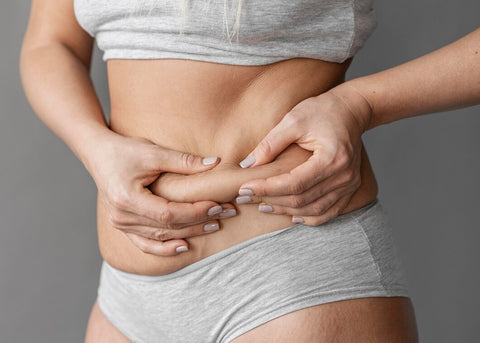Menopause is a natural stage in a woman's life that brings with it a series of hormonal and metabolic changes that can make it difficult to maintain a healthy weight. However, with the right approach, it is possible to lose weight and maintain good health during and after menopause. In this blog, we will explain the changes that occur in a woman's body and metabolism, the reasons why it can be difficult to lose weight, and effective strategies for losing weight.
Why is it difficult to lose weight during menopause?
It is common for women to experience weight gain during menopause. Weight gain often begins a few years before menopause, during the period known as perimenopause .
Losing weight during menopause can be more difficult than usual due to several factors that work against us:
- Decreased estrogen : The loss of ovarian function during menopause means that the ovaries stop releasing eggs (loss of fertility) and producing female sex hormones such as estrogen . The decrease in estrogen can slow down the metabolism and increase appetite , since estrogen has actions on appetite control and satiety . In addition, the distribution of body fat is controlled by a complex interaction between genes and ovarian hormones such as estrogen, among others, so hormonal changes during menopause will influence this distribution.
-Changes in Body Fat Distribution : Characterized by the accumulation of visceral fat in the trunk, which causes an increase in waist circumference and a noticeable change in body shape. Going from the well-known pear shape (fat accumulated in the hips and thighs) to the apple shape (fat accumulated in the abdominal area).
-Reduction in Muscle Mass : Muscle mass tends to decrease with age, which in turn reduces the basal metabolic rate (the amount of calories the body burns at rest).
-Insulin Resistance : Some women may develop resistance to insulin (a hormone that helps regulate blood glucose levels), which can make weight control difficult and increase the risk of type 2 diabetes.
How to lose weight during menopause?
Losing weight during menopause requires a multifaceted approach that includes diet, exercise and lifestyle changes.
Balanced and balanced diet
Scientific evidence supports the cardiovascular benefits of diets rich in vegetables, fruits, legumes and whole grains, including fish, nuts and low-fat dairy products; in this regard, the traditional Mediterranean diet has demonstrated significant benefits in reducing overall mortality, preventing obesity-related metabolic disorders and certain heart diseases.
An important factor for weight control is dietary measures. It should be noted that these should be established by specialized professionals, depending on the characteristics of each individual, but here are some general recommendations:
- Daily consumption of five or more servings of fruits and vegetables , as well as whole grains and legumes several times a week. With their high fiber content, they will help regulate intestinal transit.
- Reduction in salt consumption , which is excessive in our country. Be careful with the presence of salt in many processed foods, so it is advisable to check that they contain other types of seasonings such as lemon juice.
-It is advisable to eat fresh foods whenever possible instead of processed foods.
- Limit fat consumption to a maximum of 35% of total daily calories , with a predominance of monounsaturated fatty acids (healthy), present for example in olive oil. Add to the diet the so-called essential fatty acids ( polyunsaturated fatty acids) , especially Omega-3 , either through food (oily fish, nuts) or in the form of food supplements for their multiple benefits for cardiovascular and cognitive health thanks in part to their anti-inflammatory effect.
- Eliminate or reduce as much as possible the consumption of trans fats , since they increase LDL ("bad") cholesterol and triglycerides and decrease HDL ("good") cholesterol, increasing the risk of myocardial infarction and death. According to the WHO , trans fatty acids should not account for more than 1% of daily caloric intake.
-It is advisable to consume two or more dairy products daily , preferably skimmed.
Healthy lifestyle habits before, during and after menopause to combat inflammation
Fighting inflammation is crucial to maintaining good health and a healthy weight.
- ANTI-INFLAMMATORY DIET: Eat foods rich in antioxidants such as fruits, vegetables, nuts and fatty fish. Avoid processed foods and foods rich in trans fats, as we have previously mentioned. A diet with anti-inflammatory properties, such as the Mediterranean diet, is crucial to getting through the menopause in a better way. This type of diet counteracts low-grade inflammation associated with excess fat. Staying hydrated is also important, it helps the body eliminate toxins, even more so during the menopausal transition when there is a tendency towards generalized dryness in both skin and mucous membranes.
- REGULAR PHYSICAL EXERCISE (AEROBIC AND STRENGTH): Maintaining an exercise routine that combines strength training and aerobic exercises is essential. Regular physical exercise, adapted to age and individual condition, helps to maintain an adequate weight. For example, walking for 1 hour (5 km/h) consumes 300 kcal or fast walking (jogging at 8 km/h) consumes 550 kcal. In addition, physical exercise has beneficial effects on bone metabolism, both in preventing the loss of bone mass and in improving balance and reducing the risk of falls. It also helps to counteract the loss of muscle mass. Some tips that can help with a more active lifestyle can be: Do not use the elevator; Walk to work, take the bus or subway one or two stops further; Walk in your free time.
- STRESS MANAGEMENT: Stress plays a major role in weight gain. While it may initially cause you to lose your appetite, long-term chronic stress affects your ability to maintain a healthy weight. Stress generates more cortisol , which tends to generate a greater appetite for sugary or fatty foods, turning into fat that tends to accumulate in the abdomen, especially during menopause.
Many times in stressful situations we eat larger amounts or tend to snack between meals, which provides temporary relief from your episode of stress or tension, however, over time you will realize that it is a habit that gets in the way of controlling a healthy weight. Therefore, practicing relaxation techniques such as yoga, meditation and deep breathing can help you control it.
- PROPER SUPPLEMENTATION: Use supplements that help reduce inflammation. Reducing chronic low-grade inflammation associated with the menopausal transition is key, not only treating the specific symptom but going to the root cause, which aggravates the symptoms. Madequa supplements have this comprehensive approach to women's health care.
In addition to a healthy lifestyle, taking supplements can be an excellent option, especially if they are quality supplements that have effective doses and are endorsed by science and health professionals. It is important to highlight that at each stage of menopause, the physical, hormonal and psychological requirements and changes will be different, which is why the ideal is that the supplements are specific for each of the stages of menopause . At Madequa we offer a pack of natural supplements that promote an anti-inflammatory state at each stage, the Premenopause - Prevention Pack , the Perimenopause - Relief Pack and the Postmenopause - Protection Pack , adapting to the specific needs of each stage, so that you can go through each of them with confidence and well-being.
Conclusion
Maintaining a healthy weight and improving your well-being during menopause can be a challenge, but with the right approach and adopting a healthy lifestyle, including a balanced diet, regular exercise, stress management and sleep care, along with the support of quality natural supplements specific to each of the stages of menopause such as those from Madequa , it is possible. And do not hesitate to consult with a health professional so that they can guide you and help you achieve your goal.
References
Davis SR, Pinkerton J, Santoro N, Simoncini T. Menopause-Biology, consequences, supportive care, and therapeutic options. Cell . 2023;186(19):4038-4058. doi: 10.1016/j.cell.2023.08.016.
Janssen I, Powell LH, Kazlauskaite R, Dugan SA. Testosterone and visceral fat in midlife women: the Study of Women's Health Across the Nation (SWAN) fat patterning study. Obesity (Silver Spring). 2010;18(3):604-10. doi: 10.1038/oby.2009.251.
Leeners B, Geary N, Tobler PN, Asarian L. Ovarian hormones and obesity. Hum Reprod Update. 2017;23(3):300-321. doi:10.1093/humupd/dmw045.
Gómez-Ambrosi J, Silva C, Galofré JC, Escalada J, Santos S, Millán D, Vila N, Ibañez P, Gil MJ, Valentí V, Rotellar F, Ramírez B, Salvador J, Frühbeck G. Body mass index classification of missing subjects with increased cardiometabolic risk factors related to elevated adiposity. Int J Obes (Lond). 2012;36(2):286-94. doi: 10.1038/ijo.2011.100.
Pasquali R, Casanueva F, Haluzik M, van Hulsteijn L, Ledoux S, Monteiro MP, Salvador J, Santini F, Toplak H, Dekkers OM. European Society of Endocrinology Clinical Practice Guideline: Endocrine work-up in obesity. Eur J Endocrinol . 2020;182(1):G1-G32. doi: 10.1530/EJE-19-0893.
Myers CA, Mire EF, Katzmarzyk PT. Trends in Adiposity and Food Insecurity Among US Adults. JAMA Network Open . 2020;3(8):e2012767. doi: 10.1001/jamanetworkopen.2020.12767.
Knight MG, Anekwe C, Washington K, Akam EY, Wang E, Stanford FC. Weight regulation in menopause. Menopause . 2021;28:960–5.
Gold EB, Crawford SL, Avis NE, Crandall CJ, Matthews KA, Waetjen LE, Lee JS, Thurston R, Vuga M, Harlow SD. Factors related to age at natural menopause: longitudinal analyzes from SWAN. Am J Epidemiol. 2013;178(1):70-83. doi: 10.1093/aje/kws421.
Lizcano F, Guzmán G. Estrogen Deficiency and the Origin of Obesity during Menopause. Biomed Res Int . 2014;2014:757461. doi: 10.1155/2014/757461.
Menopause and obesity. AEEM MenoGuide. First edition: April 2022. karma et al, slu Barcelona 2022. ISBN: 978-84-09-40503-9.




Comments (0)
There are no comments for this article. Be the first one to leave a message!